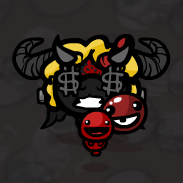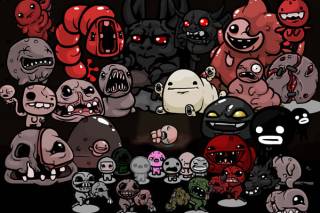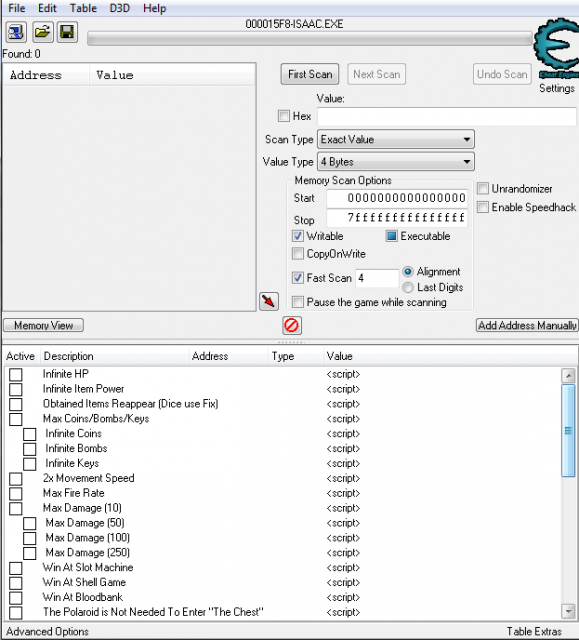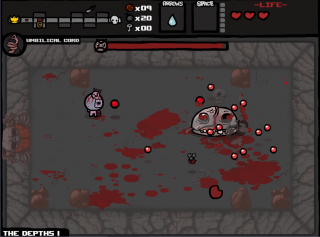Dialogue Options Vol. 5: The Binding of Isaac
By mosespippy 9 Comments
Sometimes it is fun to gush over our favorite games. Talking about them with like minded individuals can allow us to discover new aspects, appreciate the small details and relieve stress about the problems. It can also lead to insider knowledge or analysis that can diminish the experience, like seeing how the sausage gets made. Our writers decided to take a look at The Binding of Isaac for this week’s edition of Dialogue Options.

This is my Isaac
by Winternet

If people asked me to describe my “gamer attributes” I would say something like: I'm PC oriented, single player focused and I play avast array of games. This means that I don’t put many hours into one game. Even strategy games like the Civilization series; if I put more than 30 to 40 hours in it for one playthrough it’s a rarity. Despite that, I find myself with over 100 hours in The Binding of Isaac (Isaac from here on out). There’s got to be something very special with this one, don’t you think?
Now, I’m far from being an expert in this type of game, so I’m just going to say that Isaac is a roguelike game and move on from that. I’m not interested in either discussing the specificities of the genre or going down the path of “well, it’s got roguelike elements, but you can’t really call it a roguelike game” (I call it whatever I want, geez you guys are worse than the Castleroid people. Well, probably not). Anyway, Isaac is a dungeon crawler shooter roguelike with a heavy focus on the gameplay. There’s some sort of story regarding the Bible, your Mom and stuff but that is as important as a guitar in a funeral (which is to say that the story is irrelevant).

So, if it isn’t the story that made me put so many hours into Isaac, what is then? It is a combination of two things: the item system and the metagame. The Item system is what makes the game feel fresh even when you’ve played dozens or even hundreds of hours. The countless combinations that you can produce with Activated and Passive Collectibles, Tarot Cards, Trinkets and Pills makes you feel like you’re playing a different character with different strategies and abilities each time. Every level, every dungeon you go through, the character is evolving, getting more and more powerful on his way to defeating his mother, or his mother’s heart, or Satan or himself (Wait, what is this game teaching us?). Alongside the evolution of Isaac there’s also an evolution of his visual appearance. It’s not only numbers, it’s not only attack +1 or agility +2. Isaac changes his appearance with almost every item he collects and by the end he can go from looking like an angel, with his wings and a halo and a cross following him, to looking like a devil, with big black horns while riding a horse and shooting lasers from his eye, and everything in between.
The metagame is my number two and principal reason for loving Isaac so much. Getting all the achievements, trying out different strategies and item combinations, making your “Isaac” look more and more badass. Most of all, it’s the different experiences the player goes through while playing Isaac which then end up, at some point, in some kind of cathartic moment. In my case, it happened while I was trying to get the Dark Boy and the Mama’s Boy achievements, which requires the player to complete the Depths and the Womb respectively, without taking any damage. I ended up completing both achievements in the same playthrough. By the time I successfully finished the Womb, I just dropped my arms and fell in my chair. The stress and tension that had built up through that playthrough, all of it was released at once and with tears in my eyes I felt physically and mentally exhausted, spent, but also filled with joy and a sense of victory and accomplishment that probably haven’t felt in my entire video game history. At that point I realized that Isaac was something more to me than just a game. It will always occupy a place in my video game heart. A very bloody and special place.
Challenge Yourself
by Mirado

The Binding of Isaac is a game designed to be replayed; from the randomization of its content on a per run basis to the way the game attempts to end your life as soon (and as often) as possible. It seems like every facet has been tuned to say, "Don't worry about losing, just try again!" However, randomization without a deep pool of variables to pull from can only stave off boredom for so long, so it's a good thing that the game has hundreds of upgrades, dozens of items and multiple bosses for the game to combine and throw at you each and every run. On top of that, most of the upgrades have interesting synergies (and a few cases of destructive interference) that can take dozens of hours to fully explore. The depth of the content is, in one word, impressive.
Yet, after 200 hours, I find myself scraping up against the limits of the game's expanded scope (it has received numerous updates and one major expansion since release). I've nabbed all the items, beat all the bosses more times than I care to count and unlocked absolutely everything that this game has in it. At this point, I can put it on the shelf, head held high, and move on to the next game. But...I don't want to. It scratches an itch; a combination of twitch gameplay, above average difficulty and randomized content. So, how to keep playing a game that you've more or less conquered?

The answer is challenge runs. In the Wrath of the Lamb expansion a list of challenges was added into the game. These modified your starting conditions by adding items, or altering the way the game operated (removing item rooms, for example). They added a bit of freshness that I felt was missing, as no matter which character you chose, they always started with the same attributes and items listed on the select screen. Along with this, intrepid individuals, using a hex editing program called the Cheat Engine, have cracked the game wide open; using a simple series of check boxes in that program, you can alter or modify almost every aspect of the game and your character within it. It, of course, can be used to cheat; you can max out your health, give yourself the most unstoppable items, and so on.
Where we get into "two great tastes that taste great together" territory, however, is the idea of using this hex editor to build your own runs that would otherwise be impossible in the game. Simple ideas, like the fact that you can usually get only one instance of each upgrade, take on a hilarious and insane bent when you realize that giving yourself an odd mushroom for every room (an item that increases your damage and slightly grows the size of your head) will eventually cause poor Isaac to grow to moon-size proportions, eclipsing everything else on the screen. Those original interactions, the source that makes the game so enjoyable to replay, are now magnified and expanded upon to a staggering degree. What happens when you give yourself infinite item power and a teleport remote and then challenge yourself to randomly warp around with every hit? How about starting with Ipecac and My Reflection (which causes your shots to explode and boomerang, respectively)? Can you make it to the end if you only use tarot cards that you can spawn in whenever you want, and resign yourself not to use your primary attacks?
The possibilities might not be endless, but I can already see another 200 hours slipping away...
McMillen's Dungeon
by gamer_152

While The Binding of Isaac is in many ways the kind of game we could never see coming, it also makes some degree of sense that it’s the kind of game artist and designer Edmund McMillen would make after developing Super Meat Boy. Not only did the money he make from SMB give him more financial support to take risks but he was likely to be seeking a shorter project after SMB’s two year development time. We’ve seen in Indie Game: The Movie that McMillen has a deep connection to the Nintendo titles of his childhood, and SMB seemed in many ways like his Mario. The aesthetics may make it look as distant from Mario as it’s possible to get but the title, the simplistic platforming and even the character archetypes, it’s all there. And it only makes sense that after creating their Mario, a Nintendo-loving designer would create their Zelda.
I think there’s a good argument to be made for the idea that Isaac may be the most important entry in the roguelike genre; not just because it’s good but because it brought the genre to so many new people. Accessibility is often not a word I hear come up when we talk about gaming for people who are as familiar with games as we are; in fact sometimes it’s used as a dirty word, synonymous with “dumbing down”, but we can’t ignore its importance. Roguelike is a genre that has remained so niche partly because of dry mechanics and combat, steep learning curves, relatively complex UIs, and other issues. Isaac provides a simple UI, mechanics that anyone can quickly and easily understand and action based combat, while retaining that gratification of collecting loot and a punishing difficulty, with the sense of replayability and discovery that comes with a procedurally generated world.

Isaac also has unique worth in that it shows us that the pervasive myth that video games have to be serious to tackle serious topics, is just that. Despite the fact that Isaac is cartoonish and filled with humour, McMillen has said outright that the game is a satire of religion and that the contents represent the way he felt as a child; that religion was inspiring and creative but also caused him pain and pushed him away from his family. One possible interpretation of the game is that Isaac is a young, exaggerated McMillen. Even if the “dungeon” only exists in Isaac’s mind, the image at the end of the initial playthrough, in which Isaac sits alone in his room doodling dark and bizarre creations, seems oddly akin to how McMillen has described his childhood.
However you view The Binding of Isaac we can all observe that, unlike so many other games, it feels genuinely reflective of the person who created it. Similar to many indie games, it proves that even if a game is mostly developed by only two people over just three months and with a small budget, it can still be just as good as, if not better than many AAA games.
Items of Interest
By AmatureIdiot
The Binding of Isaac is a compulsive game. Once hooked, it is not uncommon for the time played to easily nudge past the 100 hour mark. What makes people go through hundreds of runs through the basements and caverns of what looks from the outside to be a pretty basic $5 game? Of course, its main strength comes from the roguelike nature of the game, each run is different, with varying items and interactions between them keeping the game fresh. This can also be a game’s weakness; where loss is the only option whether in victory or defeat. How can it keep interest when the player has reached the end of the game once?
The Binding of Isaac solves this problem by a robust unlockables system. This gives each run a new objective, whether it is defeating the final boss one more time to get that that cool new item or being prompted to play the game a slightly different way in order to get the reward of a new character. This gives each run through the same caves a meaning and a purpose, each journey may go down a similar path; but along with what you meet on it, the reward will always be new. The system also adds persistence to the game and gives the feeling of achievement and progression, even as Isaac starts at square one every time.
The slowly expanding pool of items grows in proportion to how much time has been put into the game, so the game naturally grows and expands as you play. This smartly counteracts any feelings of repetition with a steady drip of new tools and experiences that go with them. This is aided by the crucial role of items and upgrades in the gameplay. At a base level what you can do with the game is pretty simple; you can move, shoot, drop bombs and activate items. By keeping the base game simple the effect of items is magnified, allowing each the potential for them to drastically influence the course of the gameplay. The” number two” upgrade turns every enemy encounter into a nervy knife fights, while Dr Fetus casts the player as a pyromaniac, as much as a danger to themselves as the denizens of the dungeon.
In the end the Binding of Isaac is a game of kleptomania, inside and outside of the game there is always the compulsion to gather more objects. This is for good reason rather than arbitrary numerical increases. Most items garnered in the game have a unique effect, each allowing every run to be special in its own way. As you play on the game grows with you to keep the experience fresh even after hours of play, with only the game’s elite phalanx of golden gods able to say they have truly experienced all that the Binding of Isaac has to offer.
Duder, It's Over
That's all for this week. We would like more contributors. Dialogue Options originally started with roughly 20 interested writers. The number of active writers has dropped off to a small handful. If you would like to contribute 400 to 600 words roughly twice a month then send me a PM.

Log in to comment